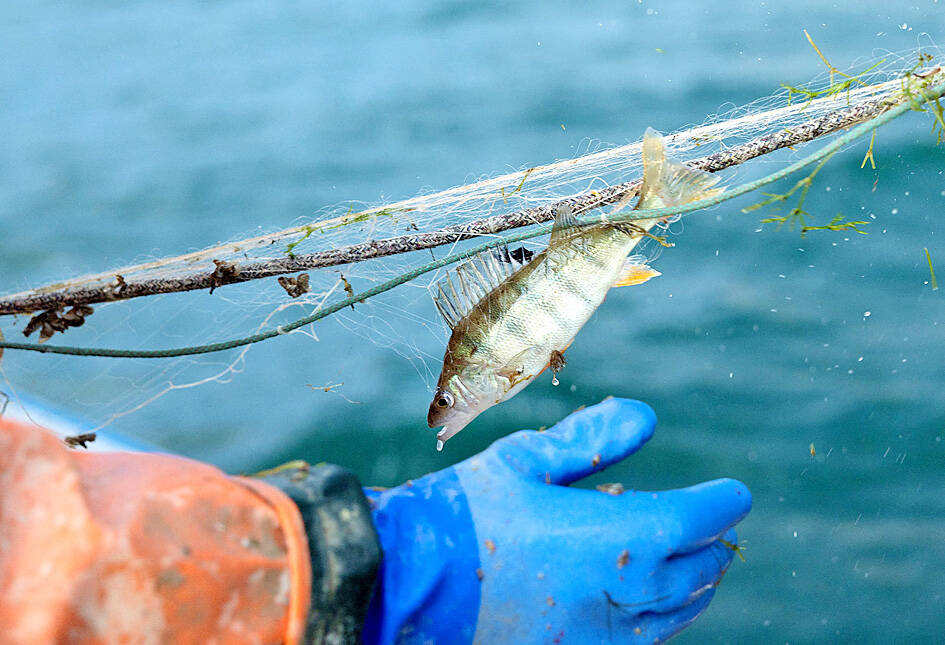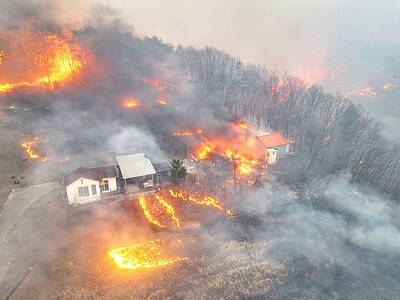Fisherman Claude Delley rattles the metal frame of his net against the side of his boat on Switzerland’s Lake Neuchatel, trying to shake off dozens of tiny, brown mussels.
Some plop back into the water, but most stay put. The sharp shells of the creatures — a fast-spreading, invasive species originally from the Black Sea — work away at the netting, meaning he has to replace it twice as often as before.
“There is no solution,” he said. “As soon as the mussel clings to the net, it stays there.”

Photo: Reuters
It is not just the nets. The quagga mussels have clogged up underwater pipelines.
Stephan Jacquet, one of a team of researchers studying the species, said he had seen Swiss native crayfish, whose population is in decline, encrusted in the creatures, threatening suffocation.
The mussels also consume huge amounts of microscopic plants called phytoplankton, leaving less for other lake creatures to eat.
“Potentially all biological categories and major links in the food chain can be impacted,” said Jacquet, who works at the INRAE CARRTEL laboratory further south in Thonon-les-Bains.
The mussels were first detected in Switzerland in the River Rhine near Basel in 2014. Since then they have spread to colonize at least six Swiss lakes, including Lake Geneva.
The population, which has few predators, is poised to multiply up to 20 times in Switzerland in the next two decades, said a study last year by aquatic research institute Eawag and Swiss universities based on trends seen in the Great Lakes of the US since the 1980s.
The mussels are already present in France and Germany.
It is not known exactly how each lake was invaded, but mussel larvae can spread on rivers or currents and be introduced into new bodies of water when boats or equipment are moved.
Once in, the species multiplies rapidly with one individual capable of producing hundreds of thousands of larvae.
“When we look underwater, we can see that it has an exponential colonization, very significant, as these ecosystems are now completely covered, from the surface to the depths,” Jacquet said.
Some Swiss lakes have been spared, including Lake Zurich and Lake Lucerne.
In some places, authorities are now considering new rules for cleaning and shipping boats to stop the spread.

DEATH CONSTANTLY LOOMING: Decades of detention took a major toll on Iwao Hakamada’s mental health, his lawyers describing him as ‘living in a world of fantasy’ A Japanese man wrongly convicted of murder who was the world’s longest-serving death row inmate has been awarded US$1.44 million in compensation, an official said yesterday. The payout represents ¥12,500 (US$83) for each day of the more than four decades that Iwao Hakamada spent in detention, most of it on death row when each day could have been his last. It is a record for compensation of this kind, Japanese media said. The former boxer, now 89, was exonerated last year of a 1966 quadruple murder after a tireless campaign by his sister and others. The case sparked scrutiny of the justice system in

A French-Algerian man went on trial in France on Monday for burning to death his wife in 2021, a case that shocked the public and sparked heavy criticism of police for failing to take adequate measures to protect her. Mounir Boutaa, now 48, stalked his Algerian-born wife Chahinez Daoud following their separation, and even bought a van he parked outside her house near Bordeaux in southwestern France, which he used to watch her without being detected. On May 4, 2021, he attacked her in the street, shot her in both legs, poured gasoline on her and set her on fire. A neighbor hearing

DITCH TACTICS: Kenyan officers were on their way to rescue Haitian police stuck in a ditch suspected to have been deliberately dug by Haitian gang members A Kenyan policeman deployed in Haiti has gone missing after violent gangs attacked a group of officers on a rescue mission, a UN-backed multinational security mission said in a statement yesterday. The Kenyan officers on Tuesday were on their way to rescue Haitian police stuck in a ditch “suspected to have been deliberately dug by gangs,” the statement said, adding that “specialized teams have been deployed” to search for the missing officer. Local media outlets in Haiti reported that the officer had been killed and videos of a lifeless man clothed in Kenyan uniform were shared on social media. Gang violence has left

‘HUMAN NEGLIGENCE’: The fire is believed to have been caused by someone who was visiting an ancestral grave and accidentally started the blaze, the acting president said Deadly wildfires in South Korea worsened overnight, officials said yesterday, as dry, windy weather hampered efforts to contain one of the nation’s worst-ever fire outbreaks. More than a dozen different blazes broke out over the weekend, with Acting South Korean Interior and Safety Minister Ko Ki-dong reporting thousands of hectares burned and four people killed. “The wildfires have so far affected about 14,694 hectares, with damage continuing to grow,” Ko said. The extent of damage would make the fires collectively the third-largest in South Korea’s history. The largest was an April 2000 blaze that scorched 23,913 hectares across the east coast. More than 3,000